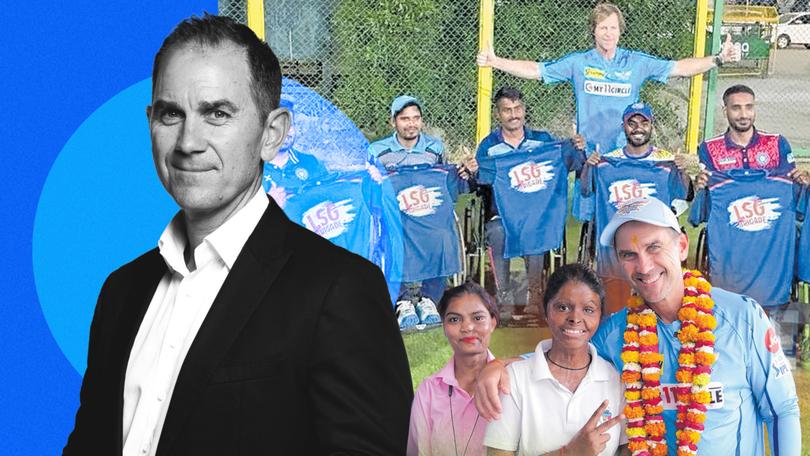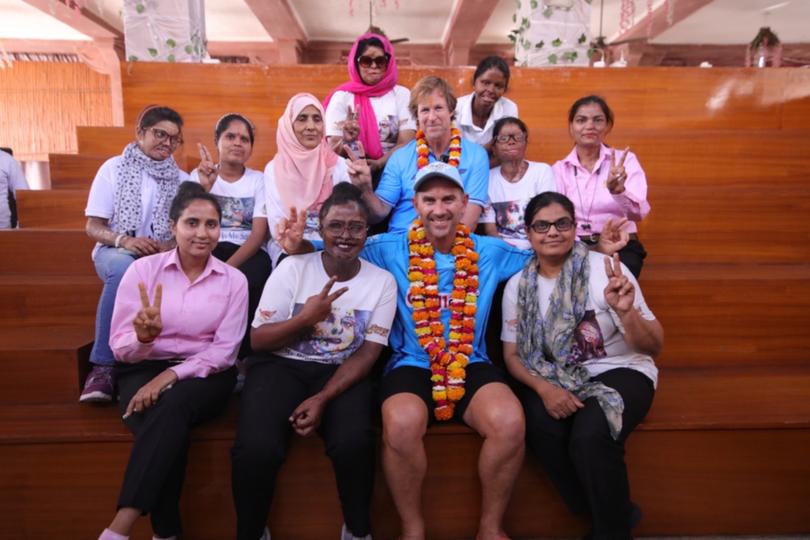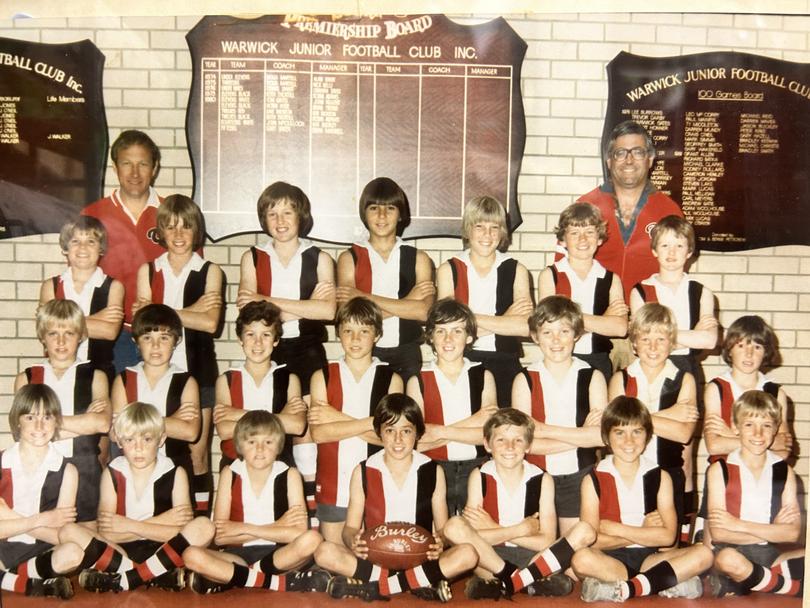JUSTIN LANGER: How a group of scarred, innocent girls in India made me realise the power of community
JUSTIN LANGER: This week in India I visited a café in Lucknow known as the Sheroes Hangout. It’s a café run by survivors of acid attacks. Women and girls with scarred faces but inspiring mindsets.

What do football, acid attacks, wheelchairs, church, grandparents, and golf all have in common?
On the surface I would say nothing at all, but over the last week, and throughout my life, I have reflected that they all share a common thread.
A thread that I have learned is credited for keeping the oldest people on earth alive and gives individuals and groups a purpose for living.
Sign up to The Nightly's newsletters.
Get the first look at the digital newspaper, curated daily stories and breaking headlines delivered to your inbox.
By continuing you agree to our Terms and Privacy Policy.That thread is community.
This week in India I visited a café known as the Sheroes Hangout. In essence, Sheroes is a café in Lucknow, in the north of India. But, the reality is this special place is a café with a difference. Set up by the Chhanv Foundation, Sheroes is run by survivors of acid attacks.
Acid attacks you might ask?
As I discovered this week, acid attacks in India are one of the most cruel, callous and cowardly attacks inflicted on women in this country. The outcomes are devastating.
Acid, once easily purchased from the shelves, is used to disfigure wives, girlfriends, sisters and strangers usually resulting from jealousy, rejection or simply, violent cowardice. Domestic violence was grossly highlighted from the moment I walked through the doors of Sheroes Hangout.
After getting my breath back from the initial shock of these disfigured faces, I was struck by the courage of these women who have bandied together to support each other when so many others in society have turned their backs on them.
One of the girls, only 16 years old, told me through an interpreter: “They make me feel like I belong, like I am part of something.”
Her words cut through me and reminded me of the empowerment that strong communities can have on all of us.

This wonderful group of women — young and old — showed me that real beauty, courage, strength and dignity lies much deeper than the skin.
In their cases, their skin had been melted away from their faces, and yet they stood tall, smiled, laughed and served us at the café with integrity and real beauty and grace.
Punching out these words on my laptop I still have a heavy feeling in my chest, and I feel so privileged to have met them.
Later that day, my assistant coach and great friend Jonty Rhodes and I visited another extraordinary person named Somjeet Singh.
Within a few hours, the power of community again struck. Somjeet is a wheelchair cricketer who started playing with a few of his fellow wheelchair-user friends in 2014. He is now the captain of India’s wheelchair team and, amazingly, there is currently 2500 professional wheelchair cricketers in India.
A love for cricket was the initial catalyst, but through his passion Somjeet has built a community of like-minded people who can now do something they may have only dreamed of in days gone by.
Watching his slick skills was heart-warming. And, as Jonty and I soon found out, not easy as we attempted to hit and bowl a ball from a plastic seat. The smile and pride of Somjeet and his community was palpable.
And as much as they seemed to enjoy our presence and interest, I gained so much more from the experience.
Flying back from Bangalore a week before meeting Somjeet and the women from Sheroes, a book called Ikigai, caught my eye in the airport book shop. I’ve read it before but I decided to grab it for the flight back to Lucknow.
The authors of the book, Hector Garcia and Francec Miralles, interviewed the residents of a Japanese village with the highest percentage of 100 year olds.
The term ikigai is broadly defined as having “a reason to live”. Simply put, what Garcia and Miralles found was that those who lived the longest not only followed simple diets, exercised gently every day, fostered collaboration and community, but also, they had discovered their “ikigai”.
They say it is their “ikigai” — their reason to live — that brings satisfaction and happiness to their lives.
Personally, my introduction to strong communities goes back to my early years playing junior footy.
The Warwick Black footy team was a community of extraordinary power for me. Through winning five consecutive premierships from the age of 10, I not only learned the infectious and addictive nature of winning, but how special the bonds of a team can be.
Our parents all became great mates and winter weekends were taken up playing football followed by barbecues, weekends away and general celebrations and festivities.
Although this all started over 40 years ago, Jeffery Gaddene, Jonny “Coops” Cooper, Wade Martin, Jamie “Billo” Billington, the Mullumby brothers, Steve “SOS” Rosich, Benny Beale, Greg “Eggsy” Williams, “Chook” Henley, Paul Graham, Scotty Curtis and “big Vlad” were just a few names who still put a smile on my face.
Football was the shared passion but, looking back, it was so much more than that. It was the community of great people that kept us feeling safe, secure, energized and inspired.

I have spent my life in teams and for this I am blessed. Not only have they given me a purpose, but they have provided an opportunity for laugher, friendship, success, and failure.
As my Sheroe friend reminded me, “They have made me feel like I belonged, like I was a part of something”.
My grandparents, without knowing, also taught me lessons about community that have had a lasting effect.
Their names were Biddy and Alan, and they were my Mum and her seven siblings’ parents. After Mum was born, Nana was warned not to have any more children for health reasons. A devout Catholic she ignored the warnings, and the rest is history.
One Christmas I was sitting next to my Nana who whispered to me that when she was a young woman, people used to say to her all the time, ‘you poor thing, you’re pregnant again, I hope you’re OK’. She confided in me that this used to wear her down a bit, but then she smiled at me and said, “but look at me now, I have my beautiful family, my kids, my grandchildren, I feel like the luckiest person in the world. I am so happy”.
My Nana’s community was her family and her church group. These made her happy and gave her purpose. I will never forget that.
Then there was my Pop, Alan. When Nana passed away from ovarian cancer Pop still had his family, a couple of his golf mates who played nine holes together at Wembley on a Tuesday afternoon, the bowling club and the church. They were all his community and his reason to live. Pop was a legend to me, a true gentleman, who I loved and admired.
Towards the end of his life, he moved into a nursing home. While he still had daily visits from his family, especially my Aunty Trish, and was very much loved, I remember leaving the last few times feeling very sad and deflated. Pop would get tearful with me, conceding he had had enough.
Looking back, I wonder if it was the loss of his friends, some his family, his mobility and purpose that was breaking his heart.
Research consistently demonstrates that people with strong social connections tend to live longer and happier than those who are socially isolated. By investing in social connection, you can experience improved mental well-being, better physical health, and a greater sense of fulfillment in your life.
Community can be defined in so many ways, but anything that has people with a shared purpose, who understand their “ikigai”, and the energy that comes from both, is valuable for all of us.
Our families are a great place to start. But with or without them, the people we choose to surround ourselves with in our lives will make us far richer and happier than any gold in the world could ever give is.
